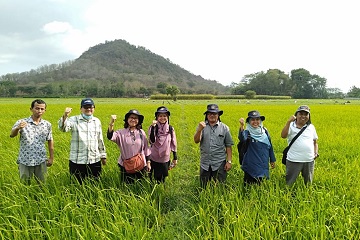The 3S IPB rice has the potential to produce 11 tons per hectare in Jember

IPB 3S Rice Varieties developed by plant breeders from the Bogor Agricultural Institute (IPB), Dr. Hajrial Aswidinoor and the team where this variety was introduced by President Joko Widodo in October 2015 received a positive response from farmers. As a form of government support in the development of the production of IPB 3S Rice varieties, the Ministry of Research, Technology and Higher Education (Kemenristekdikti) provides a grant of "Higher Education Innovations in Industry" to IPB.
As a continuation of the production of yellow labeled seed (source seed) which was bred to return to being certified commercial seeds, IPB developed spread seed production (blue label) in nine locations, namely Aceh, South Sumatra, West Java, Central Java, East Java, South Kalimantan , Central Kalimantan, Central Sulawesi, North Maluku and West Nusa Tenggara (NTB) with a total area of captivity of 144 hectares.
In order to monitor the grant, IPB Deputy Chancellor for Innovation, Business and Entrepreneurship, Prof. Dr. Erika B. Laconi, MS, Head of Food Industry Directorate General of Industrial Innovation Strengthening Kemristekdikti, Anteng Setia Ningsih, STP, MA, Team of Start-Up of IPB 3S Rice Seed Industry, Dr. Ir. Abdul Qadir, Dr. Ir. Asep Setiawan and Candra Budiman, SP, M.Sc along with representatives from PT. BLST conducted a visit to two locations of 3B IPB rice breeding in Mayang and Jenggawah Villages, Jember (4/11).
"The development of rice seed production in both locations is quite good. With a high enough humidity level and the composition of urea fertilizer reduced, it is targeted to produce approximately 11 tons per hectare. This productivity is higher than the varieties that have existed so far. In addition, IPB 3S varieties require less nitrogen fertilizer than other varieties. Less nitrogen needs make IPB3S rice more resistant to plant diseases," said Prof. Erika.
Seed production is carried out in collaboration with business partners in Jember and escorted by the Seed Certification Supervision Center (BPSB) of the Jember V Task Force. In addition, IPB developed and implemented a technology-based rice seed production innovation called IPB Prima Cultivation Technology. Prima IPB Cultivation Technology was developed by Dr. Ir. Sugiyanta, MSi lecturer at the Department of Agronomy and Horticulture (AGH), Faculty of Agriculture, IPB.
"In addition, IPB also provided assistance to farmers by experts intensively under the coordination of the AGH Seed Center-Dept. Team of the Agriculture Faculty of IPB," he added.
In addition to monitoring, IPB also held a Focus Group Discussion (FGD) on Seed Center Development at the Jember State Polytechnic (5/11).
This activity is a form of implementation of duties from the Ministry of Research, Technology and Higher Education to develop Seed Centers in Higher Education for National Seed Independence.
The event was opened by the Director of the Jember State Polytechnic and was attended by Head of the Food Industry Directorate General of Industrial Innovation Strengthening Kemristekdikti, Jember Agriculture Service, BPS V Task Force Jember, Academic Community Seed Production Engineering Study Program, breeders and seed producers, and business partners in Jember. The Directorate General of Industrial Innovation Strengthening Kemristekdikti gave a briefing on the university's innovation program and the IPB Seed Center Team delivered the concept of developing the Seed Center in higher education.
"The IPS 3S Rice Seed Industry Development Program in the Rice Production Center which has been running since 2016 (Start Up Seed Industry) has implemented product innovation, technological innovation, and system innovation and is expected to make an important contribution to the availability of national quality seeds," added Prof. Erika. (RYS)


